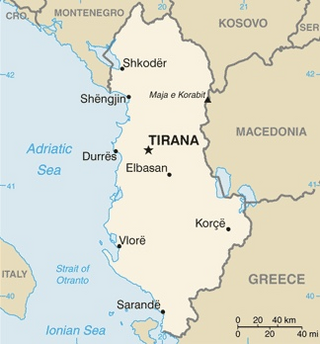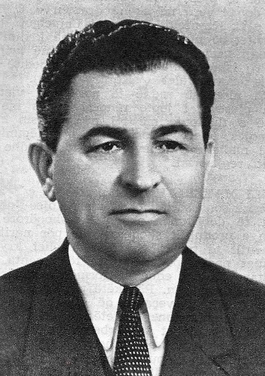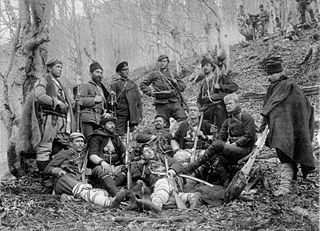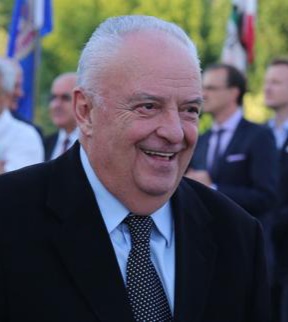Related Research Articles

Essad Toptani was an Albanian politician who served as the third prime minister of Albania from 1914 to 1916. He previously established the Republic of Central Albania based in Durrës. An Ottoman army officer, he served as the Albanian deputy in the Ottoman Parliament and later cooperated with the Balkan League after the Balkan Wars.

Greater Albania is an irredentist and nationalist concept that seeks to annex the lands that many Albanians consider to form their national homeland. It is based on claims on the present-day or historical presence of Albanian populations in those areas. In addition to the existing Albania, the term incorporates claims to regions in the neighbouring states, the areas include Kosovo, the Preševo Valley of Serbia, territories in southern Montenegro, northwestern Greece, and a western part of North Macedonia. The combination of the populations of these countries and territories of other countries sustaining large ethnic Albanian communities enumerate to over 4 million people.

Adem Jashari was one of the founders of the Kosovo Liberation Army (KLA), a Kosovo Albanian separatist militia which fought for the secession of Kosovo from the Federal Republic of Yugoslavia during the 1990s.

The Armed Forces of the Republic of Kosova was a military of Republic of Kosova, paramilitary organization and military wing of the Democratic League of Kosovo (LDK), the main right-wing party in Kosovo established by Ibrahim Rugova and Bujar Bukoshi. It was active during the Kosovo War from August 1998 until the war's end in June 1999.

Čegrane is a village in the municipality of Gostivar, North Macedonia. The village lies approximately 7 kilometres (4.3 mi) east of the city of Gostivar. Prior to merging with Gostivar Municipality, Čegrane was the seat of Čegrane Municipality.

The Battle of Junik was fought during the Kosovo War between the ethnic Albanian paramilitary organization known as the Kosovo Liberation Army (KLA) and the security forces of the Federal Republic of Yugoslavia over the town of Junik in western Kosovo.

The Ghegs, are one of the two main ethnic groups of Albanians, the Tosks being the other. The differences between the two groups are subtle, including variations in culture, dialect, social structure, and religion. The Ghegs speak Gheg Albanian, the largest dialect of the Albanian language, named after their group. The Ghegs primarily live in Albania, Kosovo, North Macedonia, Serbia and Montenegro. The social organization of the Ghegs was traditionally tribal, with several distinct tribal groups of Ghegs.
Anti-Albanian sentiment or Albanophobia is discrimination and prejudice towards Albanians as an ethnic group, described primarily in countries with a large Albanian population as immigrants, seen throughout Europe.

United Nations Security Council resolution 1101, adopted on 28 March 1997, after reiterating its concern over the situation in Albania, the council established a multinational protection force in the country to create conditions to facilitate humanitarian assistance.

Simon Stefani was an Albanian politician of the communist era. Stefani was born in Përmet. He served as Chairman of the Assembly of the Republic of Albania from 25 December 1978 to 22 November 1981, as well as member of the Central Committee of the Party of Labour of Albania from 1976 to 1991. Stefani was partly of Greek origin.

The Republic of Central Albania was a short-lived unrecognised state established on 16 October 1913, with its administrative centre in Durrës, today in Albania.

Vasil Shanto, called Vasko, was one of the founders of the Albanian Communist Party. He was the leader, along with Qemal Stafa, of the Shkodër communist group. One of the delegates of the party, he was frequently sent to meet with the Yugoslavian Communist Party.

A cheta, in plural chetas, were irregular armed bands present throughout the 19th-century Ottoman Empire, particularly in Anatolia and in the Balkans. The members of the chetas were called "chetniks".

The Sanjak of Dibra, Debar, or Dibër was one of the sanjaks of the Ottoman Empire. Its capital was Debar, Macedonia. Today, the western part of its territory belongs to Albania and the eastern part to North Macedonia.

An incident took place on the Albania–Yugoslav border in April 1999 when the Yugoslav Army shelled several Albanian border towns around Krumë, Tropojë. In these villages, refugees were being housed after fleeing the ongoing war in Kosovo by crossing into Albania. On 13 April 1999, Yugoslav infantry entered Albanian territory to close off an area that was used by the Kosovo Liberation Army to stage attacks against Yugoslav targets.

The Partition of Albania is a term used for the partition of the Albanian state, which proclaimed its independence on 28 November 1912. The delineation of the newly established Principality of Albania under the terms of the London Conference of 1912–1913 and the Ambassadors of the six Great Powers of that time left Albanian and non-Albanian populations on both sides of the border. Representatives of the Albanian national movement viewed this as a partition of claimed Albanian-inhabited territories, also territories contained in a proposed Albanian Vilayet.

The Insurgency in Kosovo began in 1995, following the Dayton Agreement that ended the Bosnian War. In 1996, the Kosovo Liberation Army (KLA) began attacking Serbian governmental buildings and police stations. This insurgency would lead to the more intense Kosovo War in February 1998.
Xhezair Shaqiri, also known as Commander Hoxha, is a Macedonian politician of Albanian descent, former member of the Kosovo Liberation Army (KLA) and commander of the National Liberation Army (NLA).

Gëzim Ostreni is a former KLA and NLA general. Ostreni is known for participating in the Kosovo War and the 2001 insurgency in the Republic of Macedonia.
The Battle of Tanuševci was the first gun battle between the National Liberation Army (NLA) and the Macedonian security forces in the insurgency in Macedonia.
References
- 1 2 Ramet, Sabrina P.; Simkus, Albert; Listhaug, Olga, eds. (2015). Civic and Uncivic Values in Kosovo: History, Politics, and Value Transformation. Central European University Press. p. 413-414. ISBN 9789633860748.
- ↑ Pettifer, James (2006). "About the author". Albanian Question: Reshaping the Balkans. I.B. Tauris. ISBN 9780857710246.
- ↑ Pettifer, James (2005). "About the author". Kosova Express: A Journey in Wartime. University of Wisconsin Press. ISBN 9780299204440.
- ↑ "James Pettifer". Simon & Schuster.